Thank you to the over 2,500 in-house professionals who attended the 2024 ACC Annual Meeting! The event was a success, with insightful sessions and valuable networking opportunities.
SAVE THE DATE. We look forward to next year’s ACC Annual Meeting in Philadelphia, PA, from Oct. 19-22, 2025. Click here to be among the first notified when registration opens.
View the AM24 highlights by day:
SUNDAY | MONDAY | TUESDAY | WEDNESDAY
WEDNESDAY, OCTOBER 9
Despite Some Headwinds, DEI Is Still Going Strong
DEI has largely been viewed as a positive development in the workplace, but the term is not without criticism. 2024 ACC Annual Meeting attendees explored the importance of DEI efforts — along with common criticisms and misconceptions — during the session “Navigating Choppy Waters in DEI: How Corporate DEI Programs Are Evolving in the Wake of SFFA v. Harvard.” The discussion covered the legal landscape of DEI, what initiatives companies have taken, and best practices for DEI going forward to foster a diverse, innovative work environment.
In-house lawyers in the audience heard practical strategies from Rekha Chiruvolu, chief diversity officer of RAND Corporation; Mira Dewji, chief inclusion and diversity officer of Seyfarth Shaw LLP; Shawn McGruder, senior associate general counsel, EEO Office, at The Johns Hopkins University Applied Physics Laboratory; Ankur Shah, associate general counsel of Freddie Mac; and Caren Ulrich Stacy, CEO of Diversity Lab.
Chiruvolu shared that diversity is about headcount — for example, how many women or people from minority groups your workforce includes. Equality means treating everyone the same, with the same resources, whereas equity is giving support and the resources people need to accomplish their goals. And inclusion is about the experience people have — creating a space where everyone can be their authentic self and have a sense of belonging. She highlighted that diversity is not about promoting a group to the detriment of another.
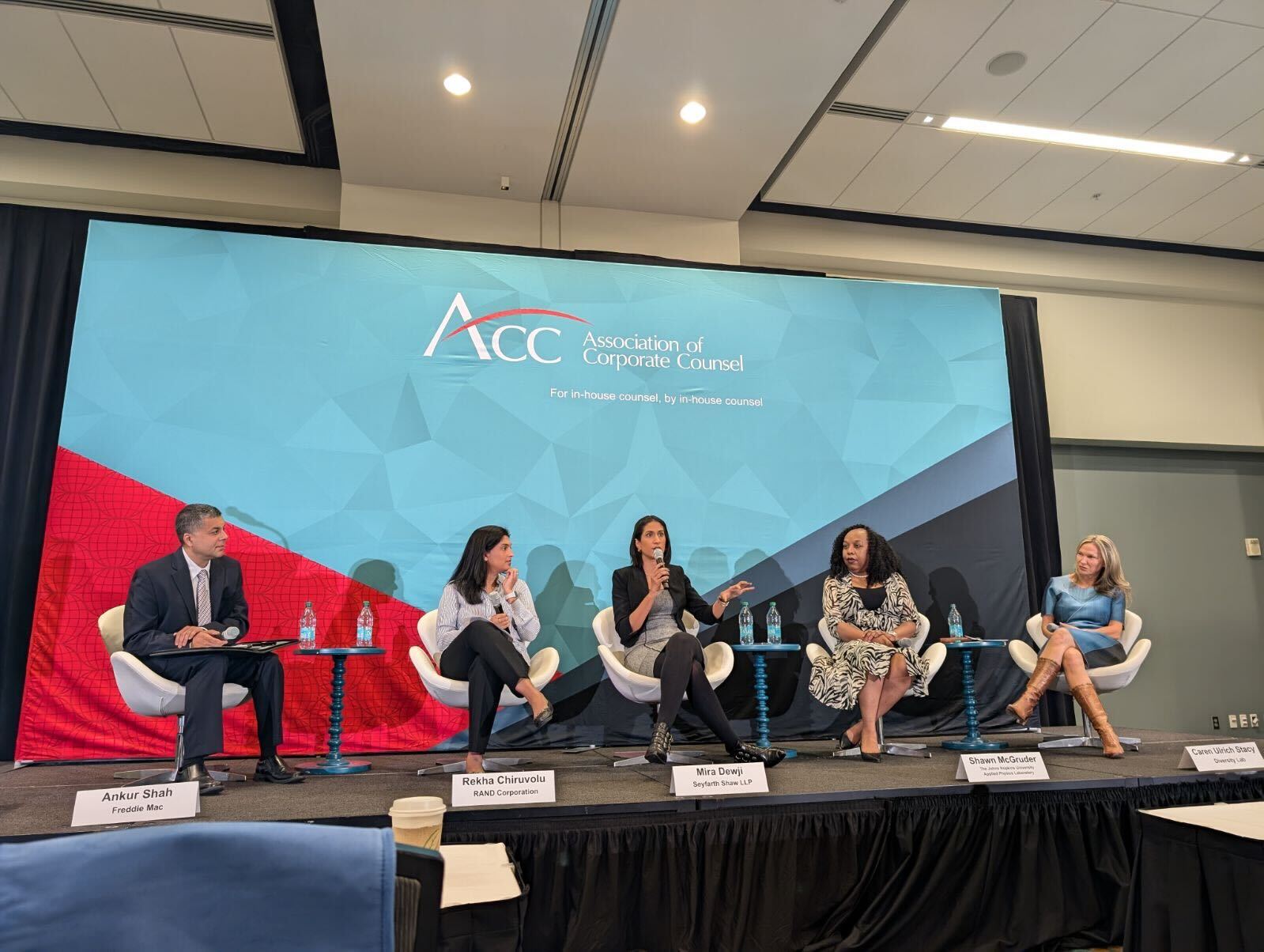
Recruiting a diverse workforce is only a piece of DEI, not the end game
Dewji highlighted the importance of not taking a short-term approach to DEI. Beware of ill-conceived DEI programs that focus just on short-term objectives. Many companies focus on recruiting a diverse workforce, but that is not sufficient. Having a diverse group is only one piece of the DEI equation. Equity involves asking yourself the question: Do we equip people to succeed?
Chiruvolu pointed out: “You can’t recruit your way out of the retention problem.” If you don’t focus on retention and advancement, you run the risk of recruits feeling tokenized for corporate image purposes. Create a culture of inclusion for everyone, where everyone feels welcome — a culture where people want to stay and thrive.
Don’t take a short-term, time-limited approach
Think about DEI not in terms of programs with a start and end date, but in terms of policy and processes that you put in place.
You can destigmatize the internal support you provide
For example, by offering coaching opportunities to all employees who reach a certain level in the organization. Also, don’t assume that people will necessarily benefit from being coached by someone who has the same profile as they do. Stacy shared that research data shows that if you are a mentor or a mentee, you tend to find people who look like you; but in sponsorship and mentorship programs, the best programs are when you pair someone with a person who is different, who doesn’t look the same and doesn’t necessarily have the same background.
Are you a multinational company? Take into account local specificities
Don’t assume that a one-size-fits-all perspective will work in all places around the world. Multinational companies should consider tailoring their DEI approach to the various regions in which they operate.
Companies have values that are meant to be universal. However, you may need to tailor your approach for people in the various countries where they are located.
Understand the people on the ground, understand who would have historically been considered marginalized in the legal industry in that country or region. In doing so, you may identify different categories or different forms of exclusion than the ones you have been using in America.
Despite the anti-DEI noise, there is still a strong ongoing corporate commitment to DEI
Following the US Supreme Court’s 2023 decision in Students for Fair Admission v. Harvard, there has been some backlash against DEI that has gathered substantial media attention. However, there is also still strong ongoing support for DEI, even though we tend to hear more about the backlash. Recent research indicates that most companies are staying the course in supporting DEI and deploying DEI programs.
DEI strategies that work in legal departments
Ulrich Stacy shared about three factors that help DEI initiatives to be effective, as indicated by research conducted by Diversity Lab:
- Data. Measure the level of inclusion of all your staff. Do you measure access to opportunities? For example, in the past year, who in your team has had opportunities to present to the board? Ask your workforce about their perception of how inclusive your team or organization are.
- Transparency. An important characteristic of organizations that have a more balanced workforce is that they have transparency. They write down how decisions are made, including advancement. Do you have a written policy stating the qualifications your organization considers needed in order to advance to the roles of DGC and GC?
- Intentionality. Be intentional in terms of creating a more equitable workforce.
Tips for DEI for the coming year
- Partner with your company’s talent team to weave the concepts of diversity, equity, and inclusion in your existing corporate training programs. This allows you to reiterate concepts in different contexts.
- Policies and practices go together. Focus on culture, the way people interact in the workplace.
- Beware of the “diversity tax.” The concept reflects that folks who belong to underrepresented groups are often made responsible for designing and sustaining their company’s initiatives, and this can backfire on their career by mobilizing their time and efforts on top of their regular responsibilities. A few ideas to address this issue: You could build that involvement in their performance metrics and compensate them for that work; or create a team that focuses specifically on that work.
- McGruder shared that companies should cast the net broadly for recruitment, go to organizations where you can find different types of talent, and make sure you give everyone access to these opportunities, to ensure greater diversity.
- With respect to inclusion, McGruder shared that companies can leverage their affinity groups, conduct “stay interviews” and culture surveys to take the pulse of what is going on in their workforce. She also cautioned that companies should be aware there is a distinction between DEI and EEO, and that DEI programs that are run poorly can get you in trouble from an EEO standpoint.
- Ulrich Stacy conclude by sharing that doing away with DEI means doing away with fairness.

The finale: AI, ethics, and a firework of positive energy!
The energy in the room was palpable during the last event of the 2024 ACC Annual Meeting: the “Closing Ethics Program – Something’s Gotta Give.”
In front of a large in-house crowd, Stuart Teicher, The CLE Performer and adjunct faculty at Georgetown University Law Center, shared practical insight on the ethical risks that come with the advent of artificial intelligence.
With great wit and humor, Teicher kept the audience highly engaged while cautioning them regarding the ethical traps and challenges that AI tools and systems present for lawyers. Below are key insights from this lively session:
Understand the rules that govern technology
Many in-house counsel move client information to the cloud and process it. With the pandemic, the use of tools like Zoom has exploded. You need to understand the rules that govern technology so you can see the issues. The use of AI falls under existing rules of ethics, as the Florida and New Jersey bars have expressed.
The rapid rise of social media, AI, and other technologies threaten lawyers’ ability to maintain an expectation of privacy over their communications with clients and safeguard their clients’ information. Yet, lawyers must use web-based services in their daily practice. This conundrum is the reason for the title of Teicher’s program, Something’s Gotta Give.
Communication
The obligation to communicate fully to the client hasn’t changed.
Do we have to inform our clients when we use AI? The New Jersey Guidelines, 2024 say there is no blanket requirement, but if the client asks or needs to know, you need to inform them of the use of AI.
The same issue was addressed in the EU AI Act, and regulations stemming from the act should be out in 2026. Even non-high-risk tools will need to comply with transparency requirements. Transparency is going to be key.
Confidentiality
Under the ABA Model Rule 1.6, we as lawyers have an ethical duty of confidentiality and must protect our clients’ information. Beware of virtual personal assistants, they might serve as access points for bad actors to get to the information in your possession.
Also beware, the confidentiality obligation applies not just to information communicated in confidence between the client and the lawyer, but also to all information relating to the representation (including public information). Under Model Rule 1.6.C a lawyer shall make reasonable efforts to prevent the inadvertent or unauthorized disclosure of, or unauthorized access to, information relating to the representation of a client, whatever its source.
4 Ethics Tips
- Be careful what you say on social media.
- Don’t sleep with your clients.
- Don’t steal from the client trust account.
- Be conscious of where data is going, and what the system is doing with the data.
Supervision
- Under the ABA Model Rules 5.1 and 5.3, you have to supervise the lawyers and the non-lawyers in your office. You must ensure that lawyers follow rules, and that your firm (or legal department) has taken appropriate measures to ensure that non-lawyers’ conduct is compatible with the obligations of a lawyer. The New Jersey guidelines say that this requirement extends to ensuring the ethical use of AI by other lawyers and nonlawyer staff.
- Rule 5.3, which regards supervision of non-lawyers, mentions the supervision of persons. The Florida bar stated that a lawyer must make reasonable efforts with respect to generative AI.
Competence
- Under the ABA Model Rule 1.1, lawyers must be (and remain) competent. That involves staying on top of technology.
- Per Opinion 2015-193 of the Standing Committee on Professional Responsibility and Conduct of the State Bar of California, a lawyer’s obligations under the technical duty of competence evolve as new technologies develop and become integrated with the practice of law.
The use of GenAI is still in an emerging phase
- If the people in your team use generative AI tools, make sure they understand the limitations, the ethics issue, and make sure that the work produced through such tools is correct. ChatGPT predicts (guesses) the next words in a sentence based on its algorithm that is trained on a massive set of data. You can’t assume that the resulting output is correct.
- Be aware that the publicly available version of a popular GenAI tool says the information you put in the tool will be used as training data.
- Even where tools say you can opt out of providing information, do you trust that these tools will respect that opt out? There have been many incidents of technology companies making commitments only to later admit that what happened ended up differing from what they initially stated.
- Be skeptical, be careful. Many tools are listening and/or recording information. In addition, these tools are the target of attacks and intrusions that access, extract, or expose information.
- This raises the question to what extent it is reasonable to trust these tools in this environment. These tools are still in a development phase, they need to be tinkered with, and to do so, often a human needs to listen to and/or review the information of users.
- Many online services’ terms and conditions say the provider may or will access your information, and may also share it with third parties. And you often can’t negotiate these standard terms.
- Creative litigators may try to argue that privilege was waived because the lawyer who used an AI or online tool had no reasonable expectation of privacy or confidentiality when they put information into such tools.
TUESDAY, OCTOBER 8
Is Your Team a Department of How?
No one wants to be viewed as the department of no. And in-house counsel can’t always be the department of flat yes all the time, regardless of what the business plans to do.
In the session titled “Balancing Being a Department of Yes with Risk Mitigation,” presented in cooperation with International Society of Primerus Law Firms, attendees learned business-friendly strategies from Spiwe Jefferson, general counsel and chief of staff of Asset Marketing Services; Abby Adams, general counsel of the National Association of Home Builders; Kathryne Baldwin, partner at Wilke Fleury, LLP; and Kimberleigh A. Ferrando, attorney at Brothers Smith LLP.
Develop your brand
First, think of yourself as a department of how. Rather than saying no, try saying “yes, if…” instead, then leading the business team to reach the logical conclusions. Jefferson shared that “being a department of yes is an imperative, but it is not easy.” It’s your job to figure out how to do it.
To be viewed as the department of how, avoid the flat no. Offer alternatives and discuss these with your business colleagues. If you determine that a requested outcome won’t be possible, explain your reasoning. Adams shared that once the business doesn’t perceive your default mode as no, they will be more open to accepting your no when you need to say it.
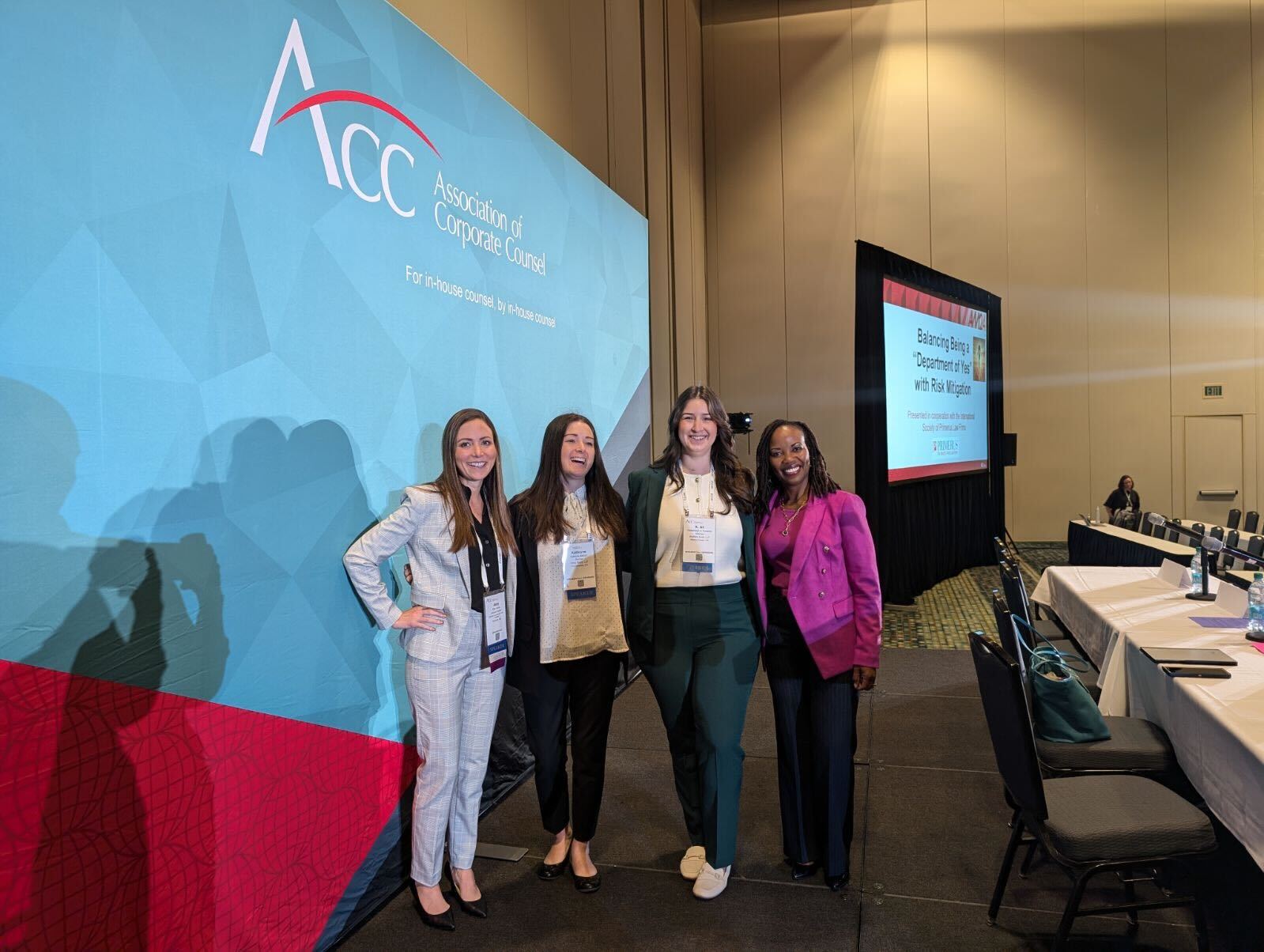
Build relationships to hear and be heard
Build relationships and learn your business stakeholders’ priorities and their preferred ways to communicate. People have different communication styles. Once you have developed relationships, you will be better positioned to hear about problems early on before they escalate.
Jefferson shared from her experience that “you attract what you reflect.” Through the way you behave, you can manifest the experience that you want your colleagues to have with you. Pay attention to what you have in common with your business stakeholders, and highlight these shared interests. Be personable and friendly. Listen actively, ask questions, and center on collective goals.
Consider doing lunch and learns regarding trends in your industry. Encourage feedback. Debrief after a project has ended — find out what worked (or didn’t work) for your stakeholders. Focus on trust. Express gratitude (e.g., take a moment to send a thank-you email). Acknowledge contributions.
Keep the stop sign in mind
Be mindful of lines that cannot be crossed. You may not assist a client to engage in criminal or fraudulent activity. If your client insists on engaging in such conduct, you may have an ethical obligation to escalate the matter within your company’s leadership (in accordance with the ABA Model Rules).
Emerging technology leads to a more complex yes
The rise of technology such as AI tools may make it more complicated and challenging to find ways to say yes. Speakers walked attendees through practical scenarios, such as how to respond to a business team asking whether they can collect and use data that is outside the permissible scope of applicable regulations.
The audience’s perspective
Adam Nagorski, associate general counsel of UL, LLC, said: “The panel was terrific and prompted a lot of great ideas about how legal departments can best partner with our business colleagues and be seen as a department of ‘how.’”
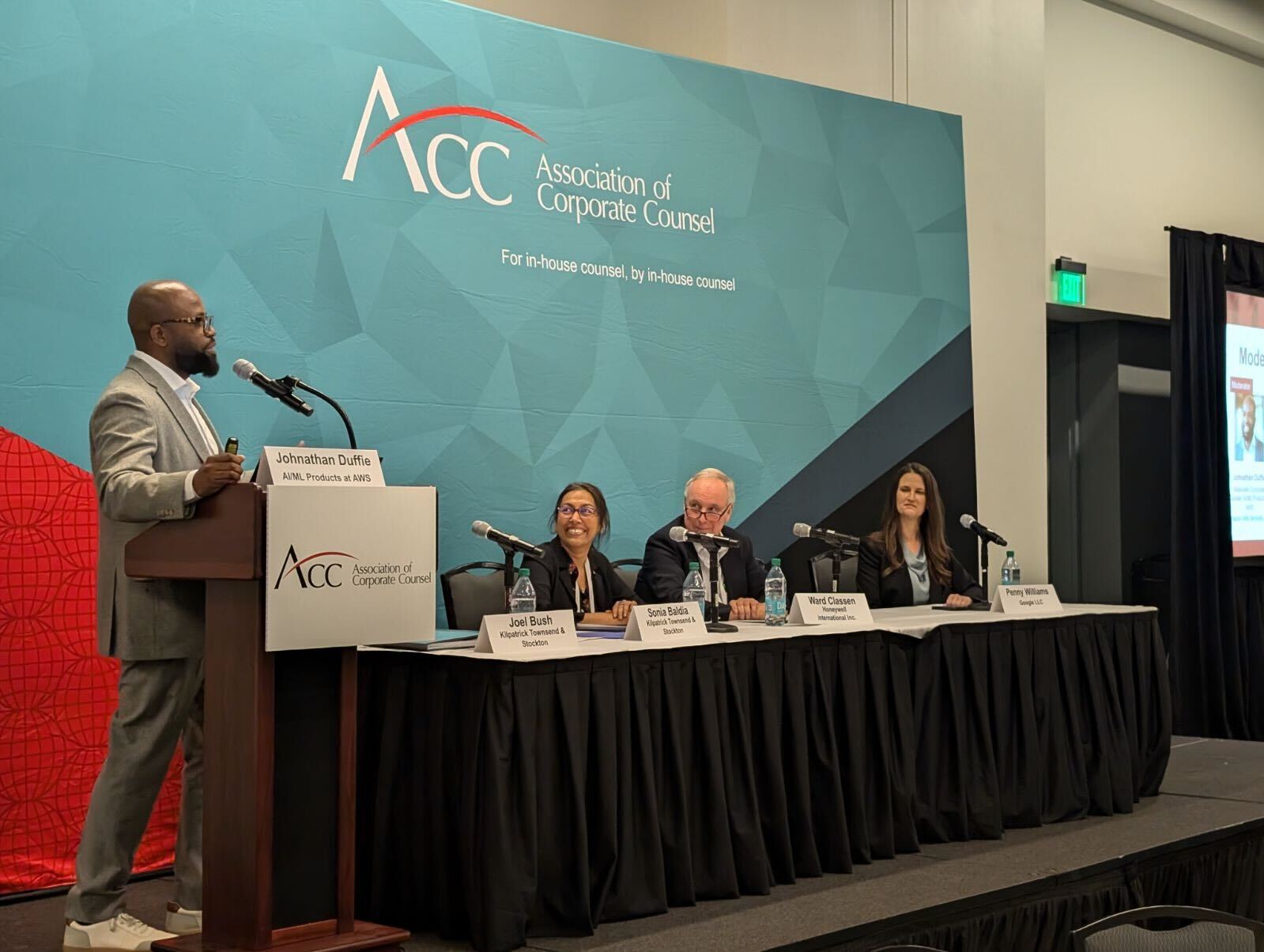
AI brings a host of new issues from “AI washing” to ethical challenges
In the session on “AI and IP: There Are No Dumb Questions,” attendees explored the risk of AI washing, the evolving landscape of AI-related clauses in contracts and terms of use, tensions over ownership and responsibility for data, prompts and outputs, as well as ethical and regulatory aspects.
Attendees engaged in roundtable discussions and heard insights from Sonia Baldia and Joel Bush, partners at Kilpatrick Townsend & Stockton LLP; Ward Classen, general counsel of Honeywell Connected Life Sciences and Logistics at Honeywell International Inc.; Johnathan Duffie, associate corporate counsel, AI/ML Products, at AWS; and Penny Williams, commercial counsel strategic industries, Google LLC.
Beware of AI washing, i.e., making false or misleading statements about your company’s use of AI. Many companies rush to claim that they are using AI in their products and services. The FTC publicly expressed its will to crack down on deceptive practices.
Speakers shared insights on AI policy adoption and on contractual aspects of dealing with providers of AI solutions. Below are eight takeaways:
- If you don’t have an AI policy, adopt one. Every company should have one – who can use AI, internally, externally, and how?
- Ensure business terms and conditions are in place in an enterprise agreements with vendors of AI-powered solutions, instead of having employees go solo and agree on their own to online terms and conditions that apply to consumer clients.
- Often the customer of the AI-solution owns the input and output. But a question is whether and for what purposes the AI tool provider will be allowed to use the input and output — only to provide the services, or also to improve the services, or also for other more or less well-defined uses that benefit the vendor.
- Before you put an AI solution on a customer-facing site, consider making your first AI use case internal facing.
- Some clients ask for clauses requiring the vendor to disclose whether it is using AI and requiring the vendor to obtain approval before new AI uses.
- In the context of existing Master Services Agreements, more and more customers ask their service providers to sign AI-related addendums.
- Most providers won’t be able to change how their AI product operates, but they will be able to change their risk acceptance (through clauses such as limitation of liability, indemnification, etc.)
- There are two main categories of AI vendors:
- On one hand, there are companies that developed their own Large Language Models (LLM), which takes a lot of capital.
- On the other hand, most other AI tools are based on these LLM models, with integrations that involve APIs and plug-ins. When you negotiate with these integrators, you tend to have very limited ability to change the terms, because a lot of their terms are flow-downs from the provider of the LLM on which their solution relies.
Spotlight: Life in a Post-Chevron World
Panelists explored how the US Supreme Court’s decision in Loper Bright and Relentless is reshaping administrative law in an engaging presentation featuring a moot court argued by two in-house counsel. The audience, playing the role of Supreme Court justices, chose a winning argument.
Using a fact pattern based on an employment issue, the parties presented two different perspectives on how courts should review agency interpretations without the benefit of Chevron deference. Following the exercise, the panelists discussed the impact the Court’s ruling is having and will have on the ability of courts to adjudicate regulatory challenges, noting that:
- Without Chevron’s command that courts “must” defer to an agency’s interpretation where the statute is ambiguous and the agency’s interpretation is “reasonable,” courts have significantly more leeway in determining whether to accept the agency’s interpretation.
- However, because Loper Bright does not provide a bright-line test, courts may continue to rely on agencies, especially in technical, data-heavy cases.
- In-house counsel should engage with their business units to better understand where there are regulatory pain points that may be worth challenging, as well understand the regulations on which the organization relies.
More from ACC Docket: What’s Next for Employers? An ACC Update on the Supreme Court’s Overturning of “Chevron Deference”
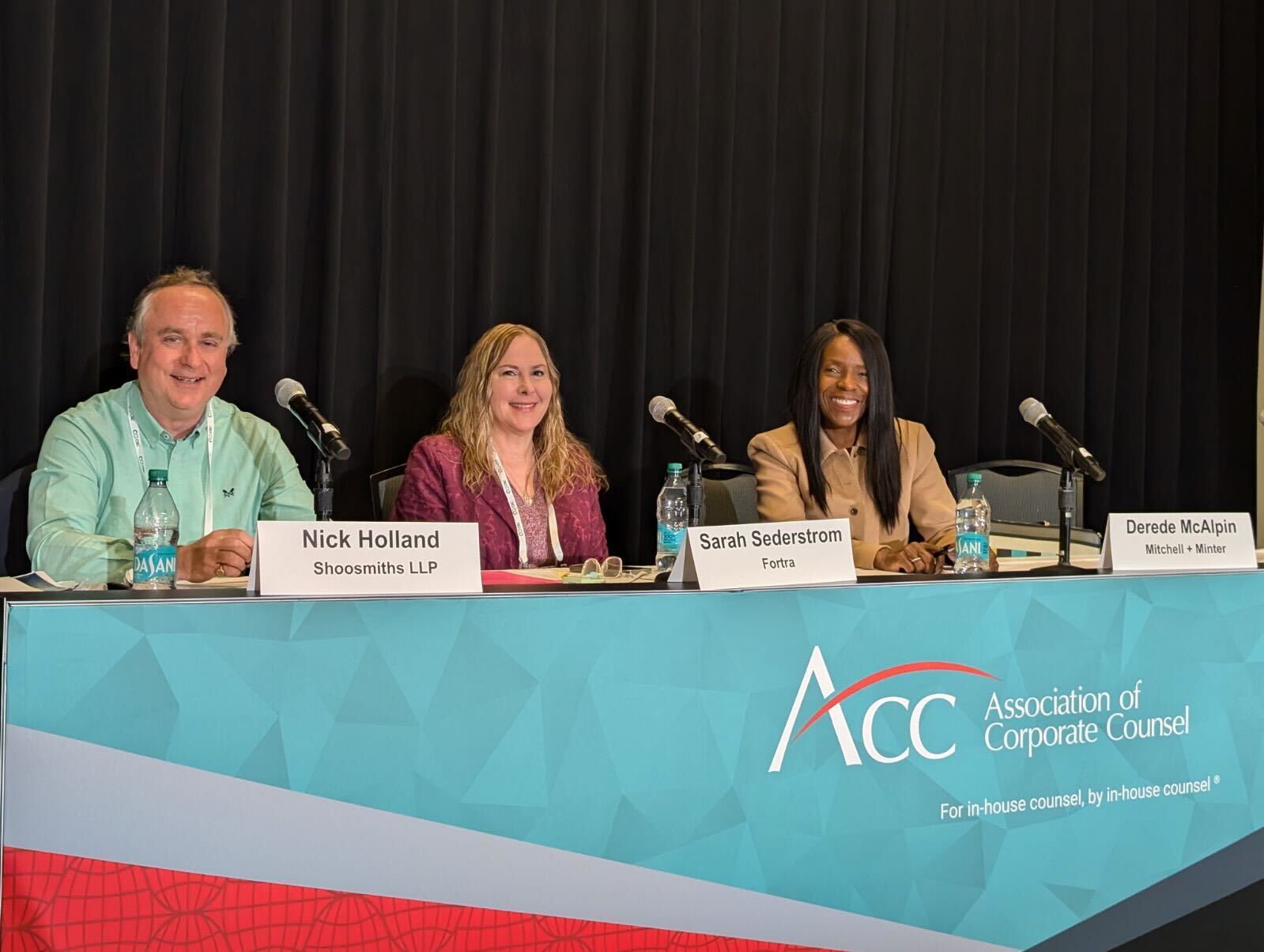
Cybersecurity keeps rising as a high-priority concern: Are you subject to NIS 2 and DORA?
Aside from AI, cybersecurity was also a topic of high interest for attendees. In the session on “Cyber Resiliency: Are You Aware of the New EU Laws?,” presented in cooperation with Shoosmiths LLP, attendees learned about two important pieces of EU legislation that are coming into force, the Network and Information Security 2 (NIS 2) directive and the Digital Operational Resilience Act (DORA).
During that session, Sarah Sederstrom, associate general counsel of Fortra; Derede McAlpin, principal at Mitchell + Minter; and Nick Holland, partner at Shoosmiths LLP, shared insights regarding these new requirements, and highlighted key cybersecurity issues.
Are you in their scope, and are you prepared?
While GDPR focused on personal information, NIS 2 sets requirements related to significant incidents involving data, i.e., a much broader scope than GDPR. And the required deadline for reporting incidents under NIS is short: 24 hours. DORA sets new requirements on financial entities and on providers of certain services to the financial sector.
While NIS 2, as a European directive, needs to be implemented into national laws by the various EU member states, DORA will enter directly into force on January 17, 2025. Four EU members states have already implemented NIS 2 into their national law.
Both NIS 2 and DORA carry substantial financial penalties for organizations, and provide for criminal and financial penalties for individuals.
Assess whether your organization is subject to NIS 2 and DORA. Even if you are an organization that doesn’t have operations in an EU member-states but have clients in the EU, you might still fall within the scope of these new rules. You may need to appoint a representative in the EU to be your nexus there for purposes of compliance with these new requirements.
Cybersecurity highlights
The panelists also pointed out the importance of updating your data mapping, having a crisis plan, and putting redundancies in place in the event of a crisis. Train your people to handle crises. Regulators will want to see that you’ve done it. Conduct tabletop exercises.
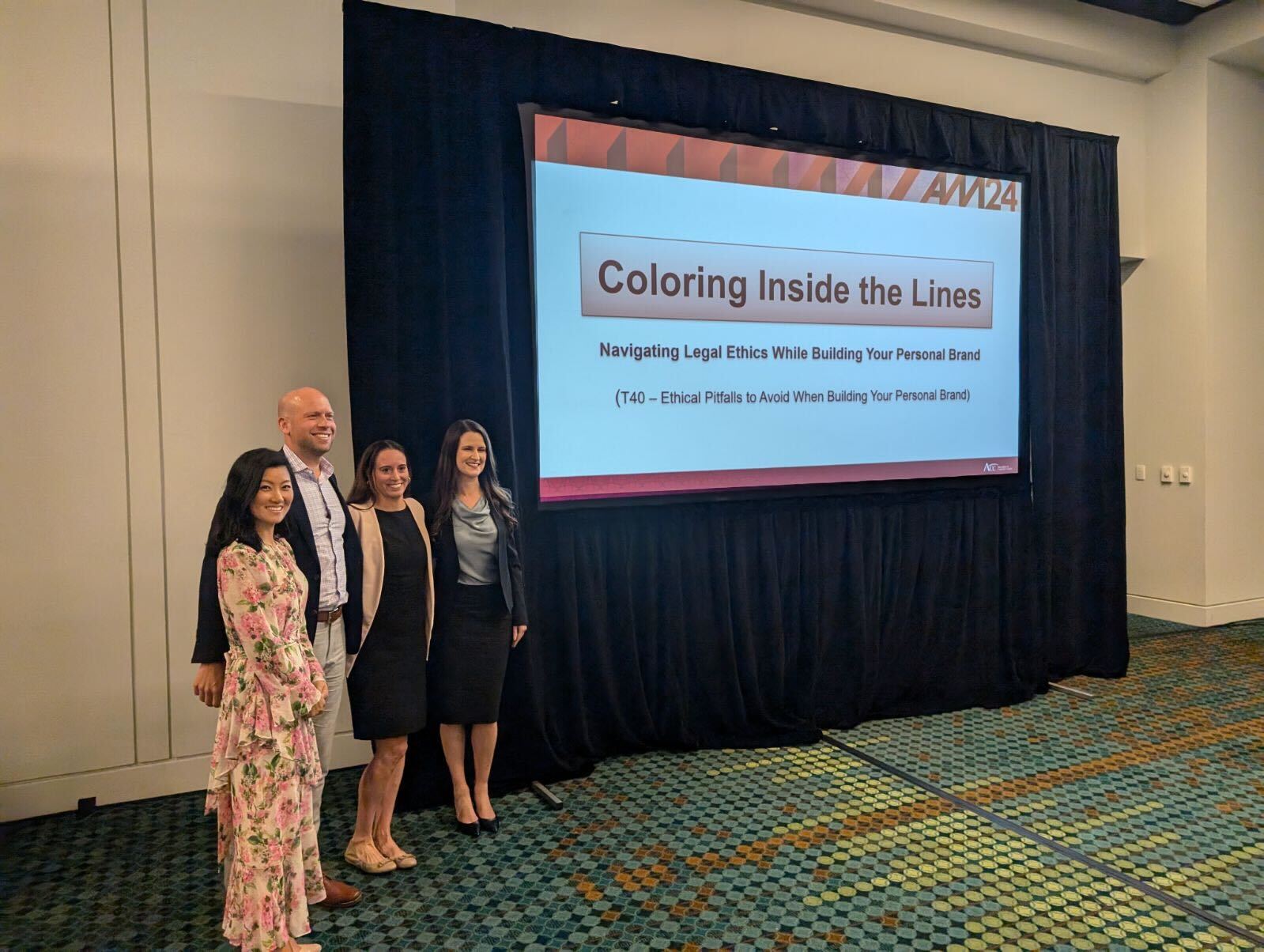
Build your career and brand strategically and ethically
In the practical session on “Ethical Pitfalls to Avoid When Building Your Personal Brand,” presented in cooperation with Consilio and the ACC Small Law Department Network, attendees explored strategies to build their brand as in-house lawyer, while staying compliant with their ethical duties.
The audience heard concrete tips to build, leverage, and evolve your brand, and ethical hypotheticals proposed by Diana Cohen, general counsel of Dr. Bronner's; Kimberly Lerman, manager of talent solutions at Consilio; Thomas Lynn, VP and chief counsel of property transactions at Caesars Entertainment, Inc.; and Penny Williams, commercial counsel, strategic industries, at Google LLC.
Stay compliant
Don’t run afoul of the applicable ethics rules in what you post about yourself and your work. Don’t make misleading statements, whether expressly or by omission.
Build and leverage your brand
- Delete old social media accounts as needed.
- Check your own online search results – if you search your own name online what will you find?
- Don’t let your professional social media profile get stale. Review and update it annually. Otherwise, you may miss out on opportunities. Take advantage of the ability to write a couple of summary paragraphs about yourself at the top of your profile.
- Evaluate your strengths and weaknesses.
- Ask others what they think of you. Reflect on the information you have learned from them.
- Develop your elevator pitch.
- Broadcast your message.
- Consider engaging a career coach.
- Be authentic – if you’re not, people will eventually find out.
- Consider getting involved in community organizations.
- Don’t expect to be noticed for good work. As appropriate, let others in your organization know about what you have achieved for the organization through your work.
- Develop a list of examples regarding your accomplishments.
- Have a network of trusted colleagues whom you can ping and who can spread the word about your accomplishments.
- Keep up with your strategic connections even after they or you leave the organization.
Don’t let your brand go stale, evolve it
- Keep up with the latest developments and emerging areas of the law.
- Make gradual changes to your brand – it takes time to build expertise in a new topic.
- Williams recommends having an aspirational brand. Look up to people who have the role and brand you aspire to. Think what your long-term brand vision is, and develop a plan to get there.
- Align your brand with the company’s strategy.
Avoid missteps
Lerman analogized personal brand with climbing a ladder: It takes a lot of steps to get to the top, but it only takes one misstep to fall down.
MONDAY, OCTOBER 7
Strategies for Exercising In-house Leadership on AI
AI is about to impact every area of our lives. You must stay up to date on these trends. Follow the rules of professional conduct. Be cognizant of your company’s proprietary information and how to keep it safe.
These were core takeaways from “How to Hack AI” session, presented in cooperation with ContractSafe,with dynamic discussions byKen Button, CEO and co-founder of ContractSafe; Nishat Ruiter, general counsel of TED Conferences LLC; and Ed Ortega, partner at Machine & Partners.
Through live demos of GenAI searches, the speakers showed attendees how to use effective prompts in a generative AI tool:
- Tell the tool what persona/role you want it to use for your search;
- Explain what you want it to do;
- Give context specific enough to elicit an answer that is not too general;
- Give examples of what you’re looking for; and
- Tell the tool what you don’t want it to do.
AI feels human-like but ..., but it is not a human brain, it simply predicts the next words following a chain of other words, based on a statistical algorithm. Don’t assume the output is accurate and of good quality. You must take responsibility and check appropriately.
Attendees explore examples of AI uses for in-house lawyers, such as:
- Asking a GenAI tool to create a summary of a court ruling that you can explain to business executive. Tip: Ask the tool to use language that a 12-year old would understand.
- Asking the tool to run exploratory data analysis on a spreadsheet or table. Tip: Export the content of a spreadsheet into a .csv format to run it through an AI tool for insights.
AI regulations are multiplying. The EU AI Act is the most substantial AI regulation. It carries significant penalties for violations: 35 million euros or seven percent of the company’s global revenue.
Effective AI governance is crucial. Attendees learned a roadmap for developing and implementing effective AI governance, during the session on “Creating an AI Governance Program” presented by the ACC Information Governance Network.
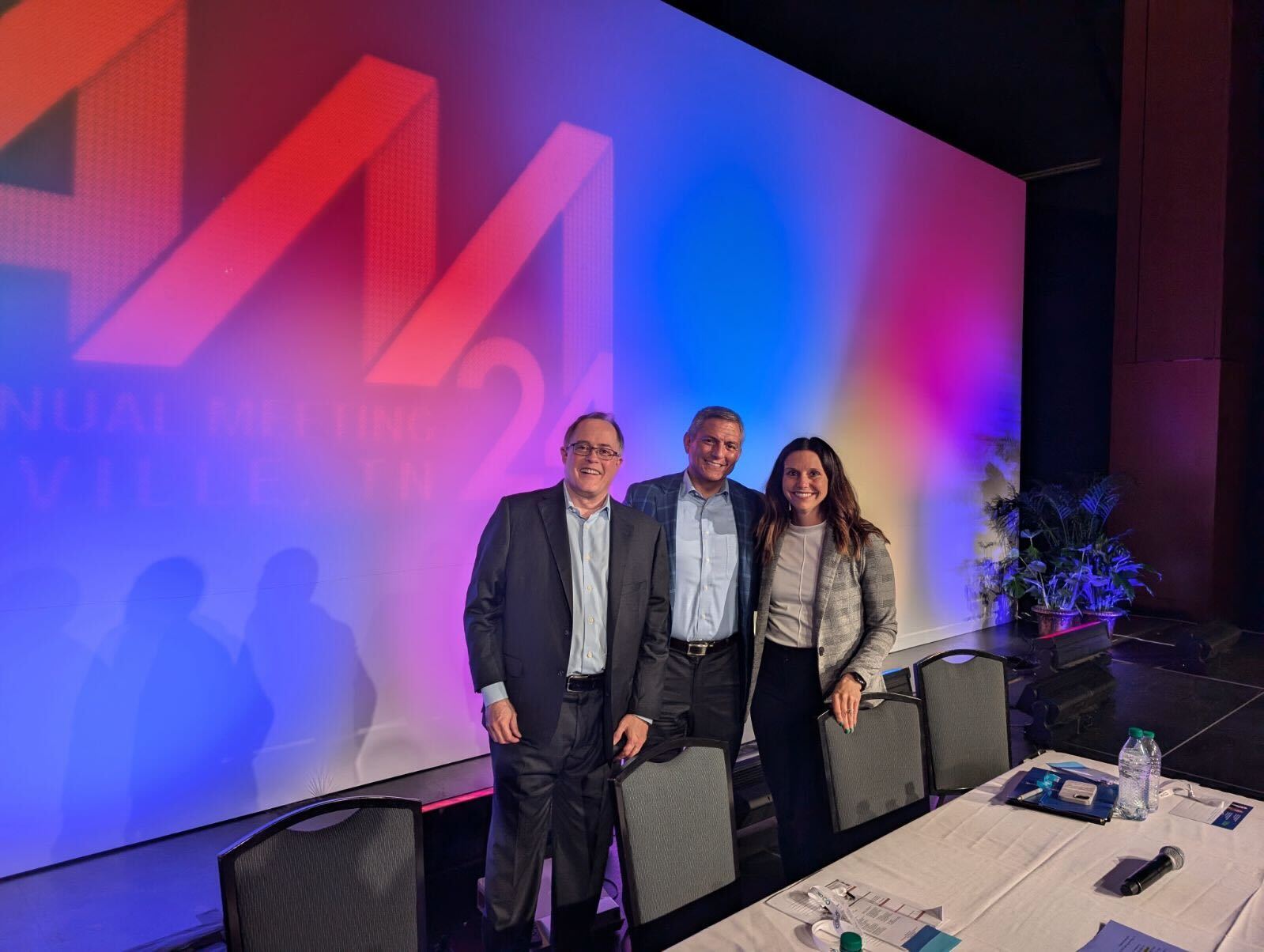
Develop a unified approach of AI for your organization, with dedicated governance policies and a governance body, as well as a roadmap for continuing improvement. Below are a few examples of practical strategies shared with the attendees in the dynamic panel discussion with Patrick Chavez, chief privacy officer and associate general counsel of Edward Jones; Tom Mighell, chief operating officer of Contoural, Inc.; and Sarah Nupdal, SVP and director of banking legal at Bell Bank:
- Identify the end goal of the business for using an AI solution.
- Define and communicate clear guardrails and requirements.
- Highlight how AI governance can benefit the business.
- Articulate how the business can use AI in a compliant and defensible manner.
- You may be able to leverage business’s desire to use AI to get other processes done — for example, telling them that to really leverage AI, you should first invest in your data governance or your Privacy Impact Assessment process.
- Consider putting in place an intake channel through which business teams need to submit proposed use cases for review before implementation.
- Regulators will ask if you have a policy, if you followed it, if you checked that you followed it, and if there were issues, how you fixed them. Be prepared, and document the steps you took.
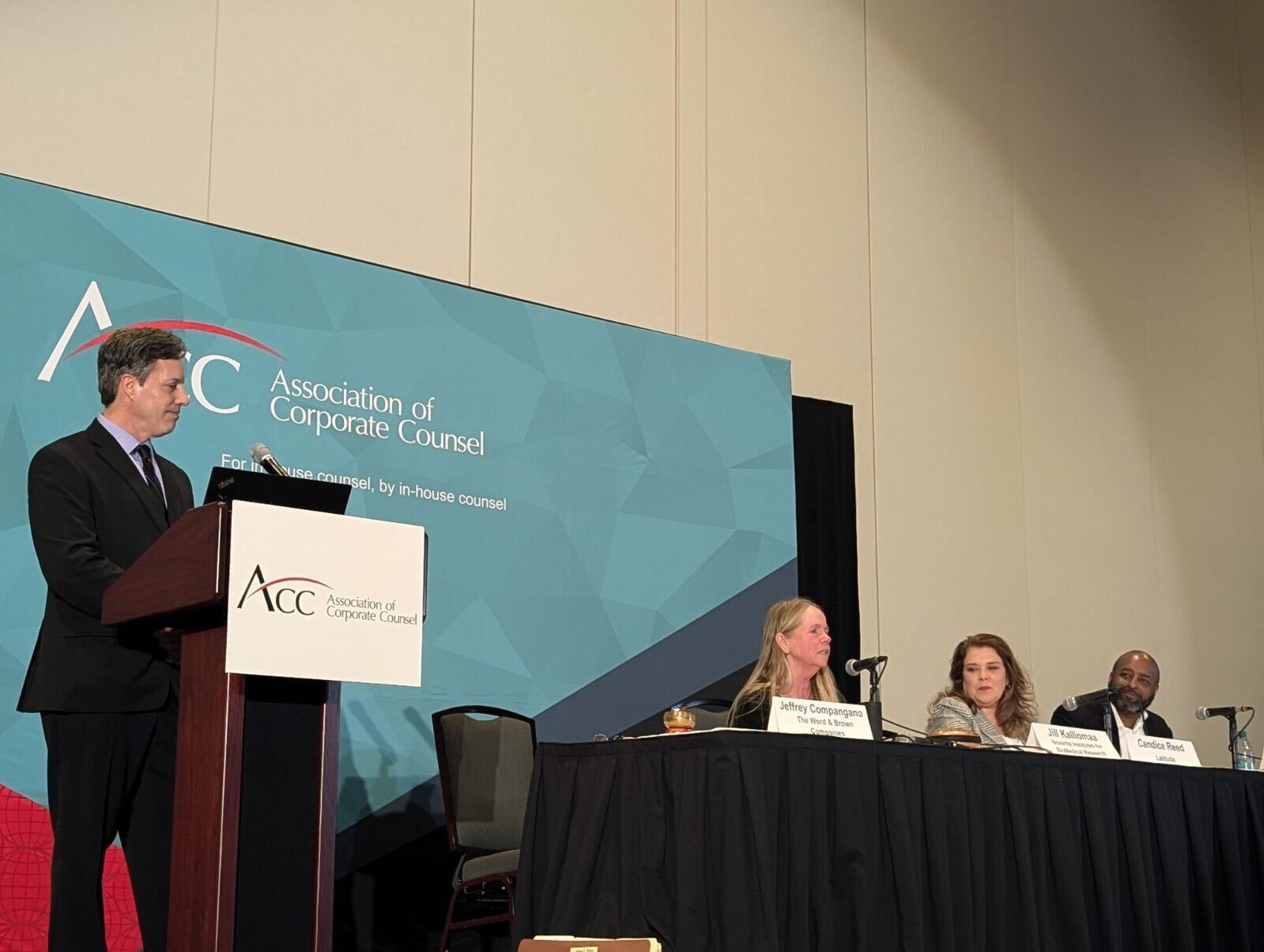
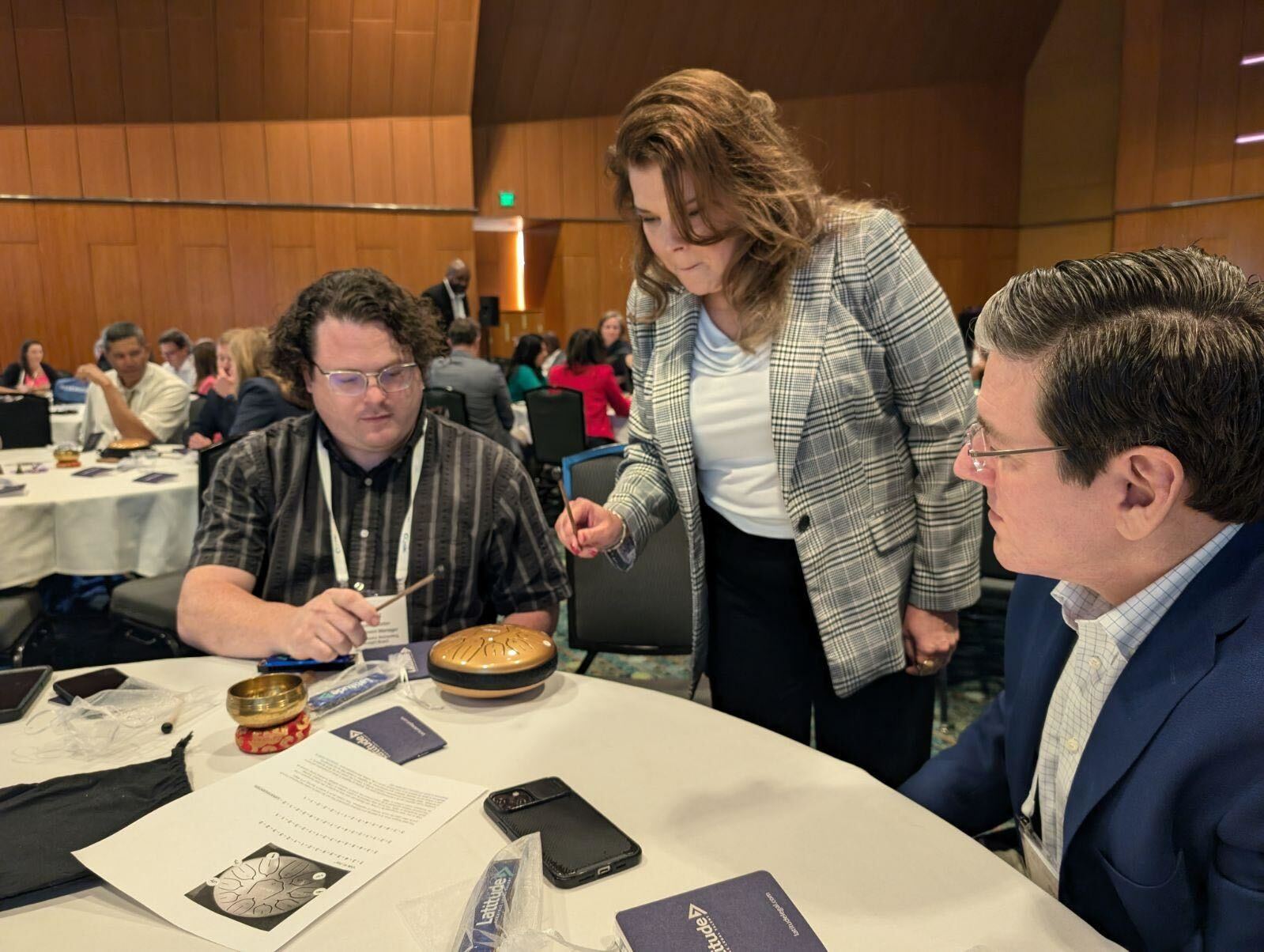
Taking care of yourself supports your ethical duties — and music can help!
In a “Mindfully Managing Your Day with Music” session vibrant with positive energy, attendees closed the day by exploring the power of music and the role of well-being as a component of the lawyer’s ethical duties such as competence, diligence, and communication. If not managed well, stress can negatively impact our work product as lawyers and our quality of life. The session highlighted the 2024 ACC Well-being toolkit for In-house Lawyers.
Attendees themselves played musical instruments during this lively session, which was led by Jeffrey Compangano, general counsel and SVP of The Word & Brown Companies; Jill Kalliomaa, senior legal counsel of Novartis Institutes for BioMedical Research, Inc.; Kobie Conner, senior director of business and legal affairs, original film, at Netflix, Inc.; and Candice Reed, EVP and partner at Latitude.

Protecting privilege for in-house attorneys
Two in-house counsel, joined by two Littler Mendelson lawyers, provided the audience with a wide-ranging overview of the key points in-house counsel should know about maintaining confidentiality over communications with their internal clients.
The panelists covered attorney-client privilege, work product privilege, and the American Bar Association Model Rules of Professional Conduct that govern confidentiality and client relationships.
Key takeaways from the presentation include:
- Be clear about when these privileges and model rules apply. For example, attorney-client privilege applies only to communications between a lawyer and client that are confidential and involve legal advice.
- To the extent possible, separate legal and business communications to avoid the “dual purpose communications” issue. When communications contain both legal and business advice, courts will apply a “predominant purpose” test to decide whether the communication should be privileged. If legal advice is the predominant purpose, then privilege attaches. If not, then the entire document, including legal advice, may be subject to disclosure.
- The ABA Model Rule 1.6’s confidentiality requirement is construed very broadly by courts. Exceptions to this broad rule include where the lawyer describes the situation without identifying the client and/or situation; crime or fraud are involved; and whether there is “substantial injury” to the organization.
- When practicing in a state where you are not licensed, consult the local jurisdiction’s rules for in-house counsel. A great place to start is ACC’s multi-jurisdictional right to practice resource: https://www.acc.com/advocacy/right-to-practice.
Spotlight: FTC Commissioner Speaks with ACC’s CLO Club
US Federal Trade Commissioner Melissa Holyoak, appointed to the commission in March, shared with ACC’s CLO Club members the agency’s top priorities and her philosophies on the commission’s role.

In conversation with Maureen Ohlhausen, partner at Wilson Sonsini and former FTC acting chair and commissioner, Holyoak named her top priorities as:
- Fighting fraud,
- Protecting vulnerable populations,
- A comprehensive federal privacy regime, and
- Anti-competition enforcement that hews closely to the FTC’s statutory authority.
The commissioner fielded a wide range of questions from Ohlhausen, concerning:
- The FTC’s well-publicized non-compete rule,
- A recent US Supreme Court case concerning the FTC’s authority to obtain monetary relief on behalf of consumers,
- The commission’s ability to keep up with technological developments such as AI, personalized pricing, and dark patterns, and
- Whether the commission’s existing statutes are sufficient to meet challenges presented by new, disruptive technologies.
When legal leaders find themselves in conversation with the FTC, Holyoak encouraged them to treat the initial meeting as an opportunity to make their best case for the commission to forego enforcement. She also stressed that her view of FTC investigations is for the commission to ensure that enforcement actions are well-supported by evidence of actual wrongdoing in line with longstanding interpretations of the governing statutes.
SUNDAY, OCTOBER 6
Help Your Business Navigate Geopolitical Challenges: How Legal Departments Lead in Times of Global Uncertainty
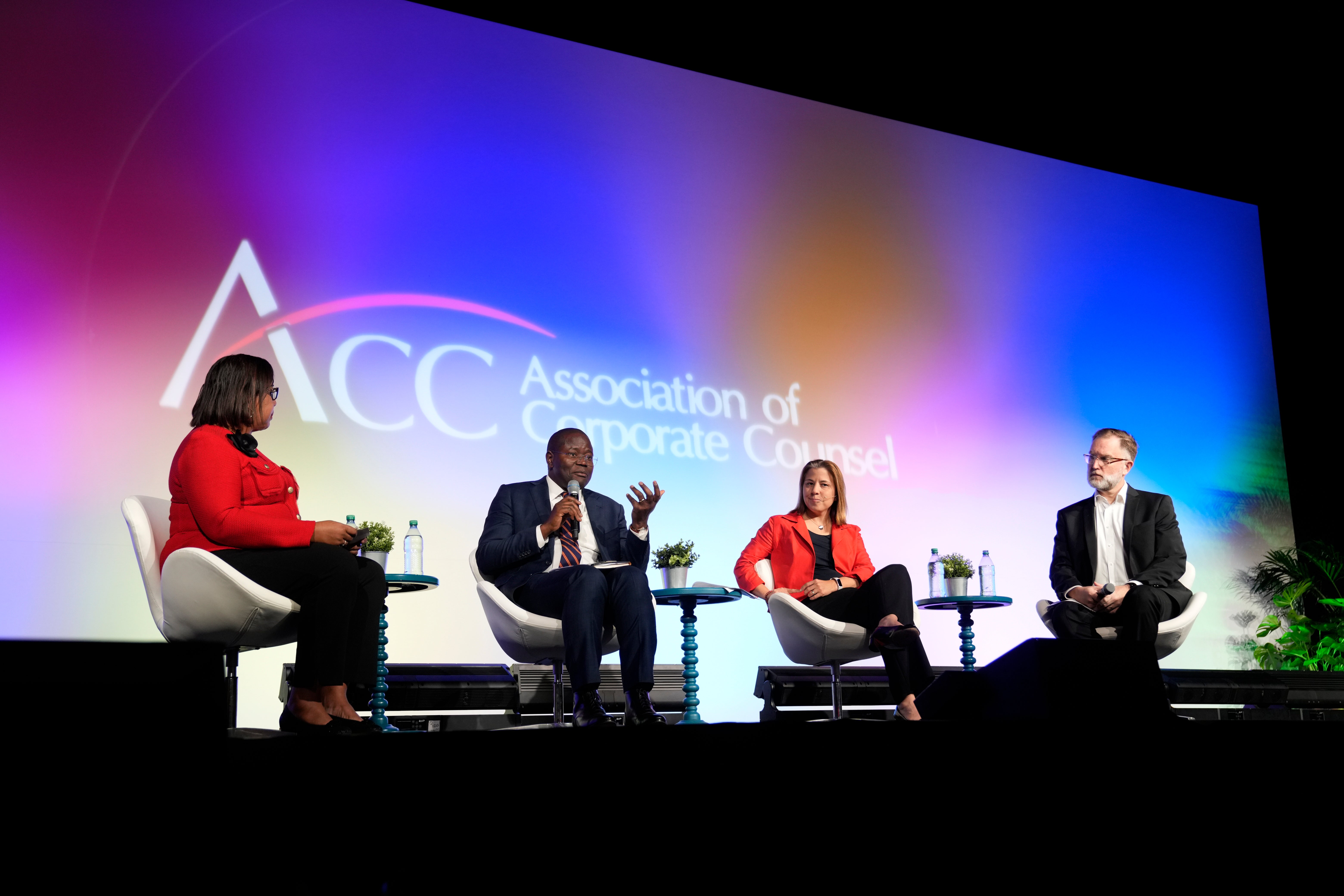
Companies often feel unprepared to address major geopolitical risks
Many companies feel unprepared to address today’s highly volatile mix of geopolitical risks. This year has seen an array of conflicts unfold, and more than half (54 percent) of the world’s population will go to the polls to vote in 2024. Meanwhile, the pandemic has highlighted the need to prepare for black swans — events that have a low likelihood of materializing and a high degree of detrimental impact.
Companies are subject to changing expectations from governments, employees, and customers, but in-house counsel can help businesses figure out how to address these.
What is your organization doing, and how can you help the business leadership navigate this highly sensitive context? During the opening plenary session of the 2024 ACC Annual Meeting, thought leaders discussed how chief legal officers and general counsel can help their organization face this challenge.
Led by ACC President and CEO Veta T. Richardson, the discussion offered strategic insights from David Bamlango, General Counsel & Deputy Group MD, Legal Services, Eastern and Southern Africa Trade and Development Bank; Michael Carney, President, U.S. Chamber of Commerce Foundation; and Maria Rocha Barros, Chief Legal and Public Affairs Officer, Booking.com.
Groundbreaking research shines a light on companies’ preparedness and concerns
The discussion highlighted findings from groundbreaking research conducted by Harvard Business School and the US Chamber of Commerce Foundation in partnership with ACC on business geopolitical risk and readiness. For example:
- Half (50 percent) of companies say they increased the number of resources allocated to managing geopolitical risks in the last five years. But 21 percent said geopolitical risks is not applicable to them.
- In response to geopolitical risk, 49 percent of surveyed companies initiated a new due diligence training process; 45 percent initiated new education/training processes related to risk; 43 percent initiated scenario planning related to risks; and 41 percent invited external consultants to provide information.
- The countries most cited as sources of geopolitical concern for the surveyed companies were China, Russia, the United States, and Mexico.
Carney pointed out that in addition to the countries that wield the largest power, every country is trying to secure its place in the new world order, which can be very challenging for businesses to navigate.
Beyond dealing with a patchwork of sanctions laws, companies sometimes need to navigate what Bamlango calls “shadow sanctions,” more subtle and informal pressures from governments in connection with sensitive geopolitical events.



Engage the right team and monitor information made available by the government
- Distinguish between mundane risk issues, such as managing sanctions compliance, and those difficult geopolitical issues that rise to the C-suite level.
- In the past, geopolitical risks were often addressed by the legal team in conjunction with public relations. Today, these risks mobilize more cross-functional teams that involve various business stakeholders.
- Consider the need to combine a global strategic overview and to have local team members who can inform the global perspective.
- Develop open lines of communication with the government to stay current on the latest available information regarding upcoming or evolving geopolitical situations.
Stay informed, develop trust, and bring strategic nuance
- Keep track of the news to stay informed. Connect the dots between what’s happening in the world, what your business does, and what can happen.
- Be out there, talking to people, and be the voice that people come to for education and pick things up early. Richardson highlighted the powerful global network that ACC offers to in-house lawyers.
- Don’t just alert senior leadership about major risks. Address “What do we do?”
- Establish trust and relationships with your stakeholders, and have an open dialogue with them before bad things happen. By doing so, you usually come out better when something bad does happens, rather than if you did not establish those relationships beforehand.
- Communication is key. If you want to do business globally, you need to nuance your points of view, so your stakeholders know how to place you.
Become adept at making effective decisions using imperfect information in a volatile context
- Determine what information you need to make a decision, and what information you are comfortable not having before you decide.
- Assess probabilities, such as the probable impact of a scenario or decision on your key stakeholders, such as the government, employees, and customers.
- Don’t make rushed decisions. Anticipate how the context is likely to evolve. Rocha Barros shared how it would have been tempting to downsize during the pandemic, and how Booking.com anticipated the post-pandemic rebound in activity and revenue and restructured accordingly.
- Be the last person in the room to voice your perspective — what you say influences others.
- To fight decision paralysis, distinguish between reversible and irreversible decisions. If a decision is reversible, you will feel less pressure and can more easily change course.
Data governance is critical to leveraging AI technology
- Richardson also highlighted the importance of the AI trend for the in-house community, and the wealth of AI-focused resources that ACC offers to its members.
- Take a global approach to managing your company’s data. Consider establishing a governance committee that directs data management.
- If your data is not good (e.g., customer data, supplier data, employee data), or if it is not well organized, you won’t be able to use it effectively for emergent AI technologies.
- Organize and “clean” your data to ensure data integrity. This costs time and money, but is necessary to be able to tap into the power of AI.
Spotlight: Key takeaway from the audience
In the audience, Brian Campbell, chief legal officer of Trajector, particularly enjoyed the importance that the discussion placed on informing yourself with the best information possible yet being ready, when necessary, to make a decision with less than perfect information after weighing the probabilities.






